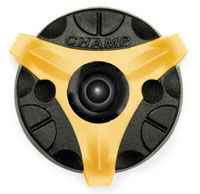 |
However, the spider wedge has proven to be much more forgiving than metal spikes for golfers covering an 18-hole course and less damaging to carefully manicured greens. The metal spikes had a tendency to tear the surface and leave the dreaded “spike marks,” which, according to the rules of golf, “cannot be repaired on the line of a putt.”
You also need fewer on each shoe (often seven versus 11 or 12) to maintain similar traction.
Indeed, many clubs have introduced a “softspike only” or “softspike preferred” policy – such have been the number of complaints from players following a golfer wearing metal spikes onto a green and leaving a telltale trail of torn grass shoots .
However, a major disadvantage of softspikes is that in wet conditions they tend to become clogged with grass and mud, reducing their traction during the golf swing and often proving dangerous when walking on slopes.
The makers of the new Pro Stinger claim that their product is not only user-friendly, but also environmentally friendly. With four “pull points” featuring a single 6mm hardened steel tip surrounded by three sets of soft, flexible teeth and six recessed lugs that prevent rotation of the foot.
MacNeill says: “Arguments have been made to regulate courses to use plastic studs only in the UK, but I find this highly irresponsible.
“Plastic cleats are known to clog and cause greens to move, especially in winter conditions and we would advocate for a two-season approach, where eco-friendly plastic cleats are worn in the summer and those made of metal in winter, when they do less damage and provide more stability and safety to golfers.

